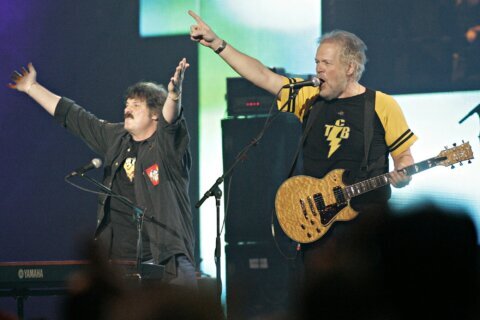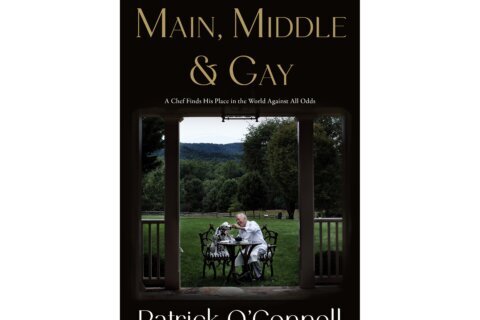He wrote two of the greatest sports movies of all time in “Hoosiers” (1986) and “Rudy” (1993) before receiving mixed reviews for less successful efforts like “The Game of Their Lives” (2005) and “My All American” (2015).
Now, screenwriter Angelo Pizzo once again returns to his favorite genre with the new baseball biopic “The Hill,” which is the definition of a faith-based, feel-good sports flick, for better and for worse — but mostly for the better if you’re a parent simply looking for teachable moments in a heartwarming family night out at the movies.
Based on a true story, the film follows the incredible true story of Rickey Hill, who was born in Fort Worth, Texas, with a degenerative spinal disease. Wearing leg braces, the resilient kid hits rocks with a stick and dreams of playing baseball, which his baptist preacher father forbids because it supposedly isn’t God’s plan. Defying his dad’s strict Bible thumping, Rickey keeps the faith and hones his God-given talents to shock the world as a power hitter.
The film hinges on the empathetic performances of both Jesse Berry (“Good Trouble”) as Young Rickey and Colin Ford (“We Bought a Zoo”) as Adult Rickey. They show genuine hurt each time Rickey’s baseball dreams are dashed by his father, played with raw emotion by veteran Dennis Quaid, who’s made a career of inspirational sports flicks with “Breaking Away” (1979), “Any Given Sunday” (1999), “The Rookie” (2002) and “The Express” (2008).
Like “Field of Dreams” (1989), this is a father-son tale as Pizzo borrows the “Rudy” theme of the father never watching his son play until the end. Instead, Rickey must lean on his girlfriend (Mila Harris/Siena Bjornerud), his grandmother (Bonnie Bedelia, “Heart Like a Wheel”), a local resident (country singer Randy Houser) and mother (Joelle Carter, “Justified”), who tells her misguided evangelical husband, “How many miracles do you need?”
Cowriting with Scott Marshall Smith (“Men of Honor,” “When the Games Stands Tall”), Pizzo refreshingly devotes most of the movie to Hill’s childhood. It’s not until the midpoint that we finally jump to him as a young adult on the diamond. In fact, the entire first hour is Rickey as a kid in leg braces, inviting comparisons to “Forrest Gump” (1994). Let’s face it, it’s hard to top Young Forrest’s braces flying to pieces as Jenny shouts “Run, Forrest, Run!”
While “Gump” straddled the line of art (Oscar Best Picture) and entertainment (No. 2 grosser of 1994), “The Hill” will divide critics and audiences. Critics may find the nostalgic glow corny and the on-the-nose dialogue unrealistic as characters say exactly what they’re thinking, but families seeking a PG sports flick don’t really care about that. They’re glad to hear a heartwarming message delivered plainly for their kids to absorb the positive life lessons.
Faith-based audiences will particularly enjoy “The Hill,” in movie theaters around the same time that “God. Family. Football.” hits Amazon Freevee. The most powerful sequence comes when Quaid gives Young Rickey an ultimatum to choose between God’s plan or his own plan. The next scene, Young Rickey says he chooses both: that God’s plan is for him to play baseball, quoting a Bible verse and drawing a cross connecting the four bases of a ball diamond.
This would have been more effective if Pizzo waited until the second scene for Young Rickey to quote the Bible verse; as written, Young Rickey quotes scripture in both the ultimatum scene and the decision scene, which slightly undercuts the power of the setup and payoff. Such screenwriter nitpicking is saved by director Jeff Celentano, who dissolves from the ball-diamond sketch to Rickey’s bat drawing a cross in the dirt of the batter’s box.
Thankfully, the movie saves the best for last with the arrival of Scott Glenn, known for “The Silence of the Lambs” (1991) and “The Right Stuff” (1983), the latter of which also starred Quaid. In “The Hill,” Glenn plays Red Murff, the MLB scout holding tryouts as the final obstacle blocking Rickey’s dreams. “I’m not just looking for guys who play baseball, I’m looking for baseball players,” he says with grit like Burgess Meredith’s Mick in “Rocky” (1976).
The tryout sequence is undeniably fun as Rickey hits dingers over the fence and into an adjacent stadium, landing like bombs next to hotshot players who already made the cut. Hall of Famer John Smoltz even makes a cameo as the stadium announcer for a climax that admirably ends in a unique way from other sports flicks. It’s not a cliche championship game, it’s a scrimmage with Rickey as a double DH. His jersey No. 11 is a nice hint to the finish.
As the stadium lights fade on a reconciled father and son like “Field of Dreams,” you can’t help but smile. Yes, it’s a “perfect” Hollywood ending, but call me a sucker for inspirational sports flicks. Sometimes you have to turn off your academic “film school” brain and tap into your heart. In other words, I can’t watch a movie like this and give it a bad grade because I know how much it will mean to so many people — and how much it actually moved me.









